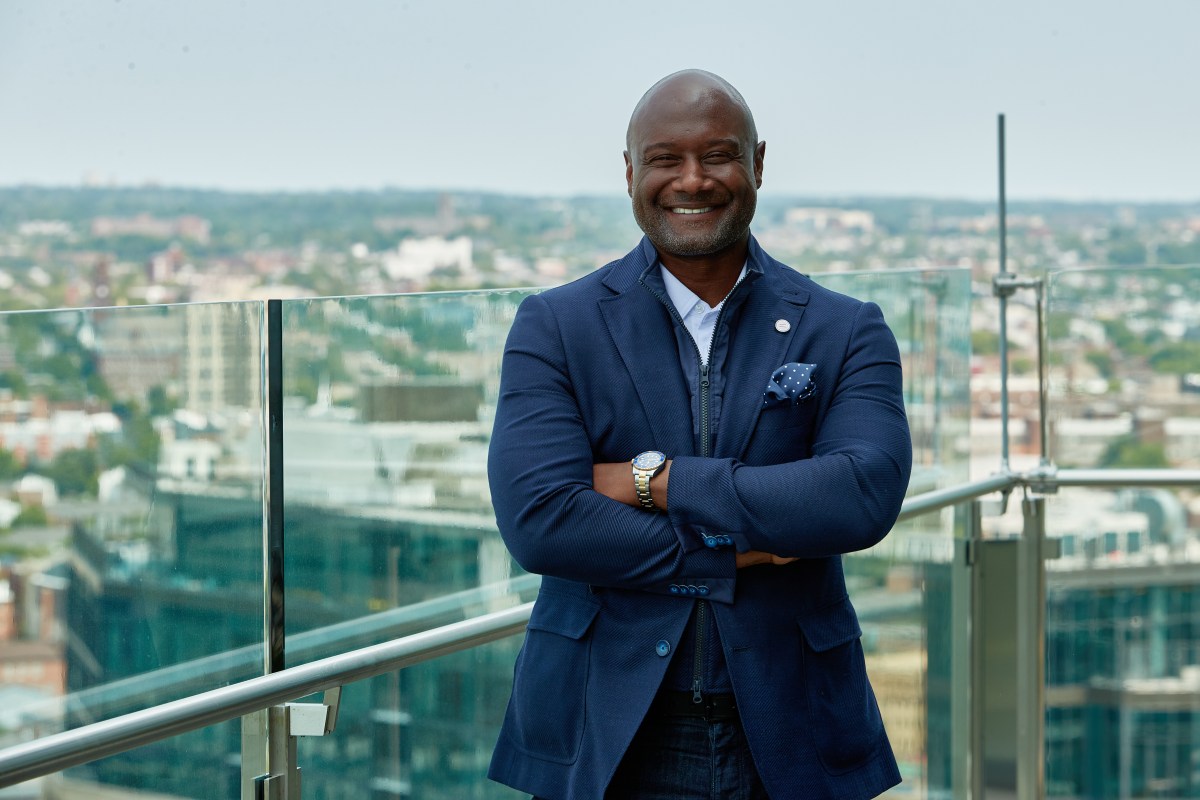A New $50M Fund in Baltimore Launches into a National Political Storm
A leading Black venture capitalist, Luke Cooper of Baltimore-based Latimer Ventures, is busy raising a $50 million venture fund focused on investing in Black- and Hispanic-owned software-as-a-service startups. A few years ago, this would have been seen as an important venture, one of dozens of independent initiatives around the country designed to get more financing to innovators of color, who are historically vastly underfunded.
But today, as attacks and criticism of race-based initiatives spread to the business world, the business models of dozens of funds like Cooper’s, some run or supported by the country’s largest philanthropists – look uncertain.
“There is an existential threat black and other minority innovation leaders are now facing,” says John Dearie, president of the Center for American Entrepreneurship in Washington.
The conservative activist group instrumental in the Supreme Court’s June decision rejecting affirmative action in collegiate admissions has sued the Fearless Fund, an Atlanta-based venture capital fund that supports Black women entrepreneurs, accusing it of unlawful racial discrimination. The nonprofit American Alliance for Equal Rights, said in its lawsuit that the Fearless Fund, is violating Section 1981 of the Civil Rights Act of 1866, a U.S. law barring racial bias in private contracts, by making only Black women eligible in a grant competition. It was filed in federal court in Atlanta, Reuters reported.
“There are already so many barriers for entry for Black venture capitalists who are trying to help underserved minority entrepreneurs,” says Cooper. “This threat will just make it harder to raise capital for my fund, but I hope it will have the unintended consequence of shedding light on the inequities minority entrepreneurs face.”
Race-based Programs under Attack
Government programs that support minority entrepreneurs are also under seige. The Small Business Administration was issued an injunction last month by a federal court in Tennessee that enjoined the use of presumed racial and ethic disadvantage as a qualification for its contracting program. In response, the agency has temporary suspended taking applications from federal contractors. And programs and funding offered by the Minority Business Development Agency are also being challenged in court as being unconstitutional racial discrimination.
Cooper’s Latimer Ventures is among dozens of such funds and initiatives around the country focused on founders of color (and often, women), including Collab Capital, Camelback Ventures and Goldman Sach’s One Million Black Women initiative. Some of the most famous entrepreneurs and philanthropists in the country have backed such initiatives, including Clara Wu Tsai, who started BK-XL, an accelerator for Black founder in Brooklyn, and Google investor Ron Conway, who has supported Los Angeles-based Slauson & Co.
Currently, less than 1% of venture capital funding is going to Black founders, according to Crunchbase’s report on Q2 2023. That’s a 40% drop in funding year-over-year, it reports. Evidence shows that the problem is not just in the venture finance system, though it’s arguably worst there. The U.S. system for small business finance often fails to reach the fastest-growing groups of small business owners, women and people of color. When white men launch businesses, especially in the tech sector, they are able to tap into powerful social-financial networks and family pools of capital that are unavailable to women and people of color.
In fact lawmakers have long been trying for years – unsuccessfully — to address the issues in the small business finance system. For instance, bills in the Senate and House to address inequities in finance: The Expanding American Entrepreneurship Act, co-sponsored by Senator Tim Scott (R-SC); and The Improving Capital Allocation for Newcomer Act, sponsored by Rep. William Timmons (D-SC). “There is now a real urgency to take action and pass this legislation,” Dearie says.
Black VCs Need to be ‘Superhuman’
“You need to be superhuman to overcome the barriers you face as a Black VC trying to raise a venture fund in the U.S. these days,” says Cooper, who has been appointed to the Pension Transition Committee for the State of Maryland. That has given him an insider’s view of the types of actionable steps lawmakers can make to turn the tide on this issue.
His committee’s recommendations are appropriate for state and federal regulators: hire more minorities and women at state and federal pension funds to lead a more diverse group of allocators; build pathways for diverse VC fund managers to build relationships with pension and public funds; and enforce diversity, equity, and inclusivity targets to promote the fair treatment of all people and enforce them with existing VC fund managers.
But for change to happen all parties in the entrepreneurial ecosystem need to work together, says Cooper. “There is a level of cultural education that needs to happen as growth investors see the value of supporting Black and other minority venture funds that support diverse entrepreneurs, and accelerators and educational support organizations help train minority founders.
Latimer Venture’s First Investments
That is the reason Cooper, a serial entrepreneur, decided to turn venture capitalist and launch Latimer Ventures last year. His goal: to fill a funding void in entrepreneurial ecosystem in the U.S. that is hampering the success of minority-owned businesses.
“I started my VC firm because I believe venture capital investing can have the biggest impact on Black communities,” says Cooper. “There is a multiplier effect in the local economy when you invest in a Black-owned tech startup. As the venture grows it generates jobs, wealth and buoys local communities.”
So far, his firm has invested $2 million in four companies — Pienso, a machine learning platform for generative AI; AI Squared, a low-code platform that helps companies integrate AI into existing applications; Meter Feeder, an app to help individuals and fleet operators pay for meter parking, and CyDeploy, an on demand software as a service testing system that shows how an update will affect your computer system.
Now he is out raising a $50 million fund set to close in November. The fund will invest $1 million to $4 million in early stage, post-seed software-as-a-service (SaaS) startups throughout the U.S. since he sees great opportunity in this sector. To date he has raised $20 million for the Latimer Fund from a financial institution, foundations, and a variety of family offices and high net-worth individuals.
“Black founders are outperforming their white counterparts in this area with 1 out of 3 getting series A funding versus 1 in 15 in the general population,” he says. “Yet the valuations of these Black-owned companies are lower reflecting bias in the VC industry.”
An Overlooked Talent Pool
Jim Gibbs, a software developer and co-founder of Pittsburgh-based Meter Feeder a mobile parking platform, experienced this firsthand when he started to raise money for his venture. “As a six-feet-four-inch Black man with dreadlocks it has been difficult to deal with the biases of white venture capitalists. They have a stereotypical image of what a software developer should look like.”
But being a Black venture capitalist in America has its own unique set of challenges. Currently only about 4% of all venture capitalists in the U.S. are Black, according to the National Venture Capital Association. Raising funds from institutional investors when you are Black can be more difficult because of legacy biases. And now specialized funds that focus on funding minority-owned businesses are under attack in court.
Cooper’s success story demonstrates that the talent pool of Black entrepreneurs should not be overlooked by investors. A serial entrepreneur, Cooper and his co-founders started a cybersecurity software company called Caldwell Technology Solutions in 2006 that later sold for $55 million to CACI International. A few years later he launched a SaaS-based mobile device repair app called Fixt that was bought by Assurant in 2020 for an undisclosed sum.
Despite the political challenges, Cooper hopes others will follow his lead. “I think a lot of companies and investors are concerned about racial inequality but are not sure how they can make the most impact,” he says. “Venture capital investing is an avenue that can make a dramatic difference.”
Cooper learned this firsthand when he was an entrepreneur who found mentors and VC investors who believed in his vision and gave him the capital, management, and growth strategy advice he needed to succeed. That includes Charles Hudson, managing partner of Precursor Ventures, an early-stage VC firm that invested in Fixt; and James Cash, a board member at several corporations including Walmart, who has given him management advice over the years.
Inspiration from a Famous Black Inventor
Cooper grew up in the Pequonnock River projects in Bridgeport, Connecticut, where life was tough. His father was sentenced to 20 years in prison when he was 12 and his mom struggled to support the family. But he could see the street where the famous Black inventor Lewis Howard Latimer grew up from his bedroom window. Latimer, the son of an enslaved couple who escaped Massachusetts, worked closely with Thomas Edison and Alexander Graham Bell and contributed to the patents of the light bulb and telephone.
“I found inspiration from Latimer’s success story,” Cooper, who named his venture firm after the inventor, recalls. “It gave me courage that I too could do great things one day – against all odds.”
That drive helped Cooper land a basketball scholarship to Adelphi University in 1994. He later went to Syracuse University where he studied law. In 2011, he got his MBA from Babson F.W. Olin Graduate School of Business. After various stints as an attorney specializing in finance and M&A, Cooper turned entrepreneur and later venture capitalist. “The key for any minority entrepreneur is not to get discouraged and always articulate your value.”

